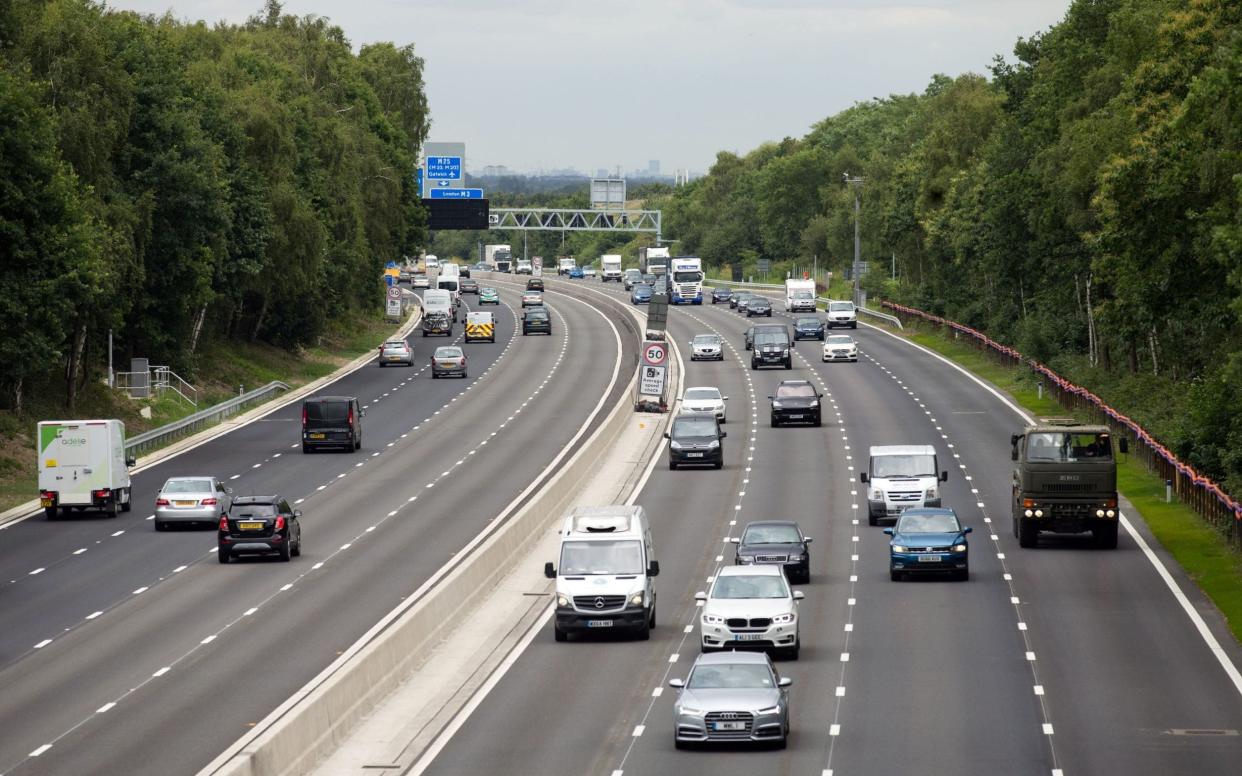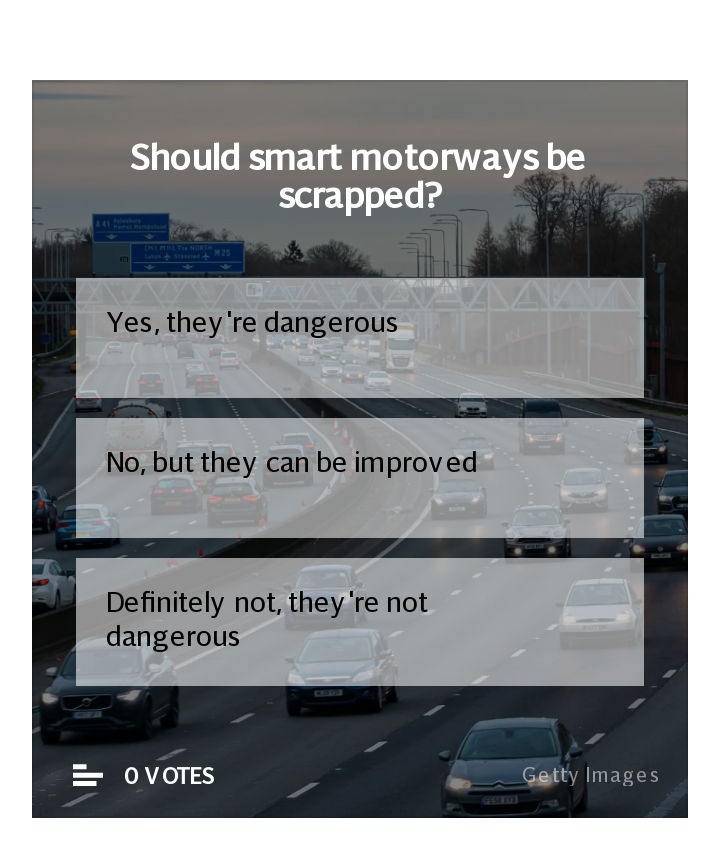Telegraph readers on smart motorways: 'There is a simple solution to improve safety'

A coroner has called for an ‘urgent review’ into the safety of smart motorways after concluding that the lack of a hard shoulder on the M1 contributed to the “unlawful killings” of Jason Mercer, 44, and Alexandru Murgeanu, 22.
Despite serious concerns over the safety of Britain’s smart motorways, the first-ever smart motorway television safety campaign has been postponed by Highways England.
Writing in the Telegraph, Ross Clark has called on authorities to use their common sense and scrap smart motorways before there are more tragedies on Britain’s roads. In response, Telegraph readers have had their say on whether the Government should persevere with smart motorways or scrap them altogether.
Read on to see what your fellow readers have had to say and then share your view in the comments section at the bottom of this article.
'Hard shoulders provide only limited safety'
@Stephen Agar
"Hard shoulders provide only limited safety. I'm sure almost all drivers and their families would want to vacate their vehicles and jump the barrier if they broke down, I would.
"However, the existence of hard shoulders must be safer than not having them."
'If you’re in a lane of traffic you are highly likely to get hit'
@John Smith:
"It is quite astonishing, isn't it, that something that is so obviously very dangerous has been rolled out at great cost and needs an inquiry to determine that the massive elephant is sitting firmly in the room.
"The Highway Code has said, for ever, that if you are stuck on the hard shoulder you should get out and sit away from your car because you might get hit. Clearly, if you are sitting in what is usually a full-on traffic lane you are highly, highly likely to get hit, even in the short period that it would take for you to get out of the car and off the road."
'Motorway signs should make traffic slow down to urban speeds'
@Huw Jenkins:
"There is nothing wrong with using the hard shoulder as an extra lane at very busy times. But to be safe, the signs surely need to make all the motorway traffic slow down to urban speeds, i.e. around 30mph (which is better than a complete standstill).
"I don't think that 'smart motorways' are a good alternative to additional lanes for more general use."
'The stopped vehicle detection radar should have 100 per cent coverage'
@Nigel Ross:
"Smart motorways should have the left lanes closed until the 'stopped vehicle detection radar' has 100 per cent coverage, and speed limits are set to 30mph whenever there is a stopped vehicle.
"It would also be good, but probably unworkable, to have some semi-rigid barrier drop from the gantry prior to the stopped car. That would clearly alert any driver, but not in a fatal way."

'Driving is dangerous'
@Andrew Knowles:
"The clip that the BBC keeps showing to demonstrate the dangers of smart motorways has more to do with drivers just simply not concentrating on what's in front of them . They have plenty of time to react but are probably looking at a phone. I see it all the time.
"It would be the same if it was a dual carriage way or single-lane road with a broken down car.
"Driving is dangerous and you have to keep your wits about you!"
'There is a simple solution which would improve safety'
@Thomas Merchant
"The purpose of smart motorways is to increase traffic capacity at times of peak demand. The extra lane (the former hard shoulder) is superfluous until traffic flows build up.
"There is a simple solution which would improve safety while not completely overcoming the obvious and inarguable danger of removing the hard shoulder: leave the red ‘X’ on the gantries above the left lane switched on as the default to close the lane.
"Only when traffic volumes build up to a certain level should this lane be brought into service as a running lane, but vitally, at the same time, speed limits must be imposed across all lanes of the motorway, perhaps 40mph on the left-hand lanes and 50mph on the right-hand lanes.
"This would go a long way to restore safety at times of light and normal traffic flow while, at peak times, the danger would be mitigated to some degree by reduced speeds.
"What we need urgently is a ministerial decree to bring the above, or some version of it, into effect while the whole future of smart motorways is reconsidered."
'Any attempt to improve Britain’s abysmal infrastructure is instantly attacked'
@Tim Barker:
"Motorways are much safer than normal roads so anything to increase their use is sensible from a safety point of view. It's easy to find someone killed on smart motorways and say that it means they aren't safe but there's far more people alive because of them – you just don't know their names.
"Overall the smart motorway rollout is a good thing and I've always noticed that any attempt to improve Britain's abysmal infrastructure (e.g. a third runway at Heathrow or HS2) is instantly attacked by the Luddites."
'They have built the refuges too far apart'
@Black Friar:
"The software has been available for 15 years that will use a CCTV camera (not radar) and will flag up a stopped vehicle to the operator, so no-one has to sit and scan lots of monitors. If the Highways Agency didn't even build this into the CCTV camera coverage then they are guilty.
"They have also built the refuges too far apart. On the M42 they are quite close together, elsewhere they are very far apart."
'There is a sweet spot of safe enough and fast enough'
@Samuel Gee:
"The part of the new smart motorways that is safer is the refuge. If you can get into one of them then you are definitely safer than if you were on a hard shoulder. But you don't need to have the whole smart motorway system to do that. You just add refuges to existing hard shoulders.
"This whole argument is a binary one in essence. Safer roads versus faster traffic and traffic flows. Somewhere on that axis is the sweet spot of safe enough and fast enough. Highways England have got that balance wrong and at huge cost.
"But the motoring public also bears some responsibility. Every time their organisations lobby for faster roads, less congestion (ignoring induced demand) and less speed enforcement, they end up pushing away from that sweet spot."
'On a smart motorway I would have had five near-death experiences'
@Owen Morgan:
"About ten years ago, my car had a blow-out in the right hand, southbound lane of the M40, a bit north of Oxford. If it hadn't been a Saturday afternoon, rather than a Monday-to-Friday afternoon, I don't think I'd have survived, but I made it to the hard shoulder. There is no way I could have made it to some refuge. My tyre was shredded.
"Although I managed to jack the car up and undo the wheel nuts, I couldn't get the wheel off, mainly because of the fear that I'd stagger out into the oncoming traffic with it. I had a mobile phone with me, but no number to ring, so I had to walk down the hard shoulder, to find a phone box, to request help.
"The men who came were very professional and came to the same conclusion that I had: it was too dangerous to try to get the wheel off there. They towed my car to a (fortunately) nearby service station and replaced my tyre there.
"That was a near-death experience, but, on a smart motorway, it would have been about five near-death experiences, all rolled into one."
Find out what stories are getting our readers talking by visiting the Telegraph Community Hub.

